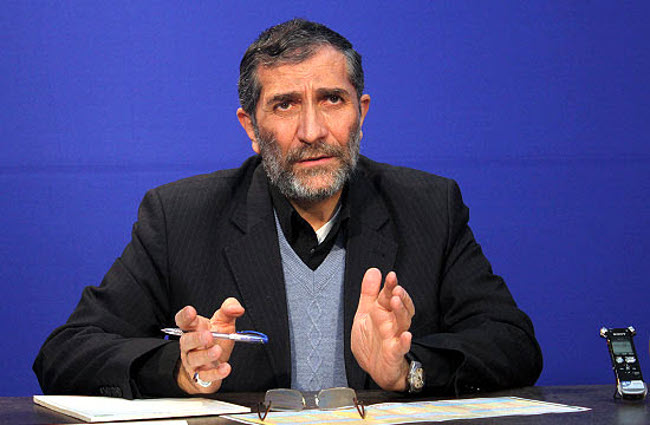by Farideh Farhi
This week has been one of high drama at Iran’s Parliament (Majles). After the Tuesday passage of a bill giving the government permission to “voluntarily implement” the recent nuclear deal—the Joint Comprehensive Plan of Action (JCPOA)—based on guidelines set by the Supreme National Security Council, the hardline MP and founding member of Steadfastness Front, Ali-Asghar Zarei, began weeping while shouting “at least appearances [of an independent Parliament] should have been kept.” Another hardline MP, the cleric Hamid Rasai, used his phone video to record the lament and then place it on his Instagram account.
The accusation was clear and simple. The hardliners who opposed the bill claimed that extra-parliamentary forces had bypassed the parliamentary process.
This time the opponents of JCPOA had it right. After the contentious Sunday session leading to the passing of the general outlines of the bill, Speaker Ali Larijani effectively foreclosed the possibility of amending the details of the bill on Tuesday. The opponents of JCPOA had reportedly prepared 200 amendments or suggestions and were planning to prolong the discussion of these amendments as long as they could. But Larijani only allowed three pre-approved and insignificant amendments. Then, in less than 20 minutes, parliament endorsed the bill itself by a vote of 161 to 59 and sent it to the Guardian Council, which also approved it quickly on Wednesday.
The tally, if the public opinion polls are to be taken seriously, more or less represented the sentiments of the country. But in circumventing debate, JCPOA supporters indeed stymied parliamentary procedures for the sake of getting an approval on the books for the JCPOA’s Adoption Day on October 18. On that day, Iran will begin rolling back its nuclear program in exchange for the European adoption of a regulation lifting its sanctions and US waivers for sanctions relief.
The opponents were livid. Larijani had out-maneuvered them, and in the process the number of MPs who opposed the bill had dropped from 100 to 59 between Sunday and Tuesday. During the parliamentary consideration of JCPOA, the opponents were able to express their opposition loudly but were not able to shape or have input in the outcome.
The parliamentary leadership allowed the reading of a highly critical report of JCPOA, which the opponents had written as the majority in the select JCPOA review committee, and then fully ignored the report when the bill was put forward last week. The opponents were able to prevent the immediate passing of the bill and forced it to go back to committee for reconsideration. But the Majles leadership refused to send the bill back to the select JCPOA review committee and instead sent it to the National Security and Foreign Relations Committee, which approved the bill in one short session and then retuned it to the whole Majles for quick consideration and approval.
Given this history one has to wonder whether the tantrum the opponents threw was real or for show. Surely the JCPOA opponents must have known that Larijani’s move to end debate had support from across the political spectrum and from the highest authority in the Islamic Republic, particularly the office of the Supreme Leader Ayatollah Ali Khamenei. In fact, a telephone call from the Leader’s office had ended several days of protests staged by opponents of JCPOA outside the parliament a week before. These protesters had camped in front of the parliament without a permit from the Interior Ministry. They were tolerated for a few days, but then a phone call from the office of the Leader ended their camp-in. The police escorted out a few protesters who resisted.
No doubt, the non-committal public position taken by Khamenei, regarding the fate of JCPOA and his suggestion that the parliament should be involved in the discussion gave opponents the opportunity to keep insisting that the agreement violates the red lines that the Supreme Leader had drawn. Perhaps, despite his equivocal public stance, Khamenei expected the opponents to know their limits and not question the process that led to JCPOA’s approval. Instead the angry MPs, like the few protesters who refused to leave, ended up challenging the whole process and publicly exposing the managed nature of the parliamentary review.
In the angry exchanges that occurred after the bill’s passage, hardline MP Mehdi Kouchakzadeh revealed that the wording of the bill and added amendments had been crafted in a meeting the night before that included Larijani, Supreme National Security Council secretary Ali Shamkhani, and Asghar Hejazi, one of the most senior members of the office of the Leader. Kouchakzadeh insisted that the bill had nothing to do with the Leader. Larijani also publicly stated that the Leader did not intervene in the parliamentary process.
But the mere mention of Hejazi’s name was sufficient to suggest otherwise. In fact, it was so obvious that the leading hardline newspapers opposing the JCPOA such as Kayhan decided to delete Hejazi’s name in its highly critical reporting of the parliamentary session and only mentioned Larijani and Shamkhani as the masterminds of the bill and its amendments. On Wednesday the office of the Leader itself felt compelled to issue a statement stating that any “wrong and muddled reporting and statement regarding the independent role of some of the officials” in his office is “false and without merit.”
Continuing the pretense that the Leader is not fully supportive of JCPOA allows the hardliners to maintain their critical stance. But this pretense cannot allay the dismay or betrayal that the hardline rank and file must be feeling right now regarding the active stamp of approval the Leader has given to a compromise deal that they insist crosses some of his publicly stated red lines.
Photo: Ali-Asghar Zarei





